Saudi Arabia bans waterpipes, creates national awareness and adapts smoking cessation services during COVID-19
Introduction
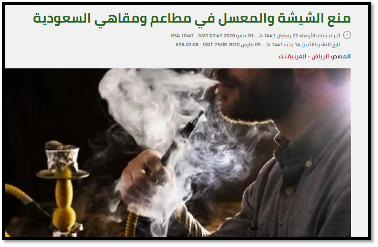 In response to the COVID-19 pandemic, the Saudi Arabia Ministry of Health set up the COVID-19 Follow-up Committee under the chairmanship of His Excellency Health Minister, Dr. Tawfiq bin Fawzan Al-Rabiah. The Committee formed from a number of governmental entities and bodies, and it oversees all COVID-19 related activities and developments. The Committee runs regular press conferences to update the public with the latest developments of the pandemic across the Kingdom. Saudi Arabia’s Ministry of Health is focusing on three main areas within tobacco control: enforcing a ban on waterpipe use in public places, national awareness campaigns and smoking cessation services.
In response to the COVID-19 pandemic, the Saudi Arabia Ministry of Health set up the COVID-19 Follow-up Committee under the chairmanship of His Excellency Health Minister, Dr. Tawfiq bin Fawzan Al-Rabiah. The Committee formed from a number of governmental entities and bodies, and it oversees all COVID-19 related activities and developments. The Committee runs regular press conferences to update the public with the latest developments of the pandemic across the Kingdom. Saudi Arabia’s Ministry of Health is focusing on three main areas within tobacco control: enforcing a ban on waterpipe use in public places, national awareness campaigns and smoking cessation services.
Ban on waterpipes in public places
The Ministry of Municipal and Rural Affairs on 9 March ordered a ban on use of waterpipes in all restaurants, hotels and cafés operating in the Kingdom to limit the spread of COVID-19. The Ministry tweeted: “Waterpipes and tobacco (mu’assal) were banned in cafés and restaurants and in all municipalities as a precautionary measure to preserve the health of citizens and residents from coronavirus”.
Teams from municipalities and from the National Committee for Tobacco Control carried out field inspections around the clock, to ensure that the ban was implemented and followed strictly. To-date, there are no violations to the ban. One of the challenges was dedicating fieldworkers for inspections as organizationally they are part of the public health teams and with the outbreak of COVID-19 most efforts were channeled to it; however, this was resolved quickly thanks to all parties’ enthusiasm and cooperation.
Awareness campaigns during COVID-19
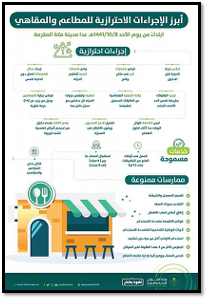 The National Committee for Tobacco Control has run a number of awareness campaigns showing the link between tobacco use and the transmission of the virus that causes COVID-19. Dr Mansour Zafer Alqahtani, Secretary General of National Committee for Tobacco Control and Supervisor of Tobacco Control Programme presented two awareness videos on the topic. The videos were disseminated widely through social media platforms especially Twitter which is followed heavily in the Kingdom. Channel 1—the highest viewed channel in the Kingdom—hosted Dr. Alqahtani to talk about the same topic.
The National Committee for Tobacco Control has run a number of awareness campaigns showing the link between tobacco use and the transmission of the virus that causes COVID-19. Dr Mansour Zafer Alqahtani, Secretary General of National Committee for Tobacco Control and Supervisor of Tobacco Control Programme presented two awareness videos on the topic. The videos were disseminated widely through social media platforms especially Twitter which is followed heavily in the Kingdom. Channel 1—the highest viewed channel in the Kingdom—hosted Dr. Alqahtani to talk about the same topic.
With the start of Ramadan, a themed awareness campaign was launched. During the first week of the Holy month, His Excellency the Minister of Health presented a video on smoking cessation under the title of: “Help us to help you”. The video was aired daily for one week in between programmes and in all breaks.
In addition, the National Committee for Tobacco Control has run a number of awareness campaigns on its website and Twitter account. The campaigns—based on World Health Organization materials—included posters, frequently asked questions, infographics and debunking misinformation.
Adapting smoking cessation services
The National Committee for Tobacco Control has shifted its smoking cessation services to online and phone consultations in light of lockdown restrictions. In spite of a number of technical challenges, this shift has covered 70 clinics across the Kingdom. The Committee has launched a number of initiatives, one of which is the home delivery of medications under the title of “Your treatment will reach you … when you are at home”.
In recognition of World No Tobacco Day 2020, the National Committee for Tobacco Control piloted a virtual platform for smoking cessation clinics for one month. The clinics were accessed by individuals both inside and outside the Kingdom. The platform was publicized on the highest followed news account in the Kingdom, followed by more than 13 million people. The platforms’ link was pinned on the account on World No Tobacco Day 2020. In addition, the hashtag #WorldNoTobaccoDay2020 was activated and was trending in the Kingdom. These online activities were supported by a number of banks and organizations. Saudi Arabia’s Ministry of Health launched an internal communications campaign about cessation services for its staff titled: “Your health is in health … the time has come”. Saudi Arabia’s Ministry of Health has publicized these numerous efforts on its website.
Way forward
The Government of Saudi Arabia has developed a country-wide phased plan to start lifting restrictions and resuming normal activities, subject to the COVID-19 situation across the country. The plan consists of three phases. The first phase started on 28 May 2020. Future plans include continuation of virtual cessation clinics alongside walk-in clinics to provide more accessibility to patients.
Related links
Minister of Health stresses the importance of quitting smoking (YouTube)
Sudan creates national awareness and bans waterpipes during COVID-19
Introduction
The Sudan Federal Ministry of Health ramped up health awareness activities in response to the COVID-19 pandemic. The Ministry is focusing on two main areas within tobacco control: a national awareness campaign and enforcing a ban on waterpipe use in public places.
Awareness campaign during COVID-19
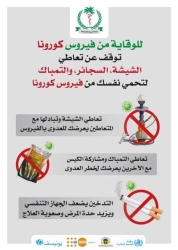 Sudan’s Federal Ministry of Health, on 20 March 2020, launched an awareness campaign focusing on COVID-19 prevention, protection and risk factors. Within that, smoking was highlighted as one of the key risk factors. The campaign—in collaboration with the World Health Organization (WHO)—was in partnership with the United Nations Children’s Fund (UNICEF), United Nations Population Fund (UNFPA), and Save the Children on the funding side and with nongovernmental organizations and the Sudanese Red Cross for wider distribution of messages. The awareness campaign included the use of flyers, posters and billboards on main roads. The posters were clearly displayed in public places such as markets, restaurants and cafés. The posters were also distributed through the Health Promotion Directorate’s Facebook page and social media platforms as well as through WhatsApp messaging.
Sudan’s Federal Ministry of Health, on 20 March 2020, launched an awareness campaign focusing on COVID-19 prevention, protection and risk factors. Within that, smoking was highlighted as one of the key risk factors. The campaign—in collaboration with the World Health Organization (WHO)—was in partnership with the United Nations Children’s Fund (UNICEF), United Nations Population Fund (UNFPA), and Save the Children on the funding side and with nongovernmental organizations and the Sudanese Red Cross for wider distribution of messages. The awareness campaign included the use of flyers, posters and billboards on main roads. The posters were clearly displayed in public places such as markets, restaurants and cafés. The posters were also distributed through the Health Promotion Directorate’s Facebook page and social media platforms as well as through WhatsApp messaging.
Sudan’s Federal Ministry of Health has adapted its communication strategy to reach communities during lockdown and restrictions. Dr Sara Elmalik, Manager of the Health Promotion Directorate at the Federal Ministry of Health stated: “The communication strategy with the community has changed because people are staying at home”. The strategy included the development of a song titled ‘Salam al’ayd ana khalito’ (I had stopped shaking hands). The song was widely disseminated through radio, television and social media platforms. The Ministry is using text messaging to reach out to communities targeting more than 1 million mobile subscribers. The Ministry is launching shortly a message around the dangers of using waterpipes which callers will hear when they are on waiting. In addition, the Ministry is using megaphones to broadcast different announcements to communities. Key television programmes hosted specialists to talk about the use of tobacco and respiratory diseases. Viewers were able to interact with these specialists by calling in and asking questions. In addition, the Khartoum State Tobacco Control Programme conducted a number of awareness raising activities such as the distribution of 20 000 brochures and 10 000 posters in seven localities. The Programme held orientation sessions targeting hotels, restaurants and mosques as well as various audiences such as employees of government and private companies, prisoners and homeless children.
A study is planned, in partnership with UNICEF, to measure the impact of the awareness campaign. A key challenge has been the lack of a specific fund for tobacco control activities—therefore, funds are reallocated to tobacco control from other health promotion activities.
Ban on waterpipes in public places
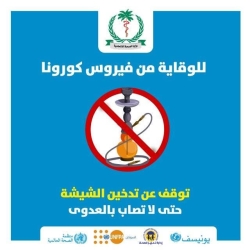 The General Secretariat of the Khartoum State Government issued a decree, on 19 March 2020, banning waterpipe use across Sudan. The decision was published in national newspapers and discussed widely on their pages however, the press service has been discontinued since, due to COVID-19. The decree was met with some resistance and many violations from restaurants and cafés. Using waterpipes in the privacy of homes, especially by youth, still poses a challenge.
The General Secretariat of the Khartoum State Government issued a decree, on 19 March 2020, banning waterpipe use across Sudan. The decision was published in national newspapers and discussed widely on their pages however, the press service has been discontinued since, due to COVID-19. The decree was met with some resistance and many violations from restaurants and cafés. Using waterpipes in the privacy of homes, especially by youth, still poses a challenge.
Way forward
The Government of Sudan has developed a country-wide transition plan to eventually return to normal activities, subject to the COVID-19 situation across the country. Future plans are in place to continue the ban on tobacco use in public places especially waterpipes after the lockdown restrictions are relaxed.
Future plans include: the issuance of a number of ministerial decrees covering graphic health warnings; a total ban on tobacco advertising, promotion and sponsorship including corporate social responsibility activities in line with Article 13 of the WHO Framework Convention on Tobacco Control (WHO FCTC); and rules of engagement with the tobacco industry in line with Article 5.3 of the WHO FCTC. In addition, high level political engagement and advocacy is planned to support the implementation of graphic health warnings.
Future plans also include a tailored mass media campaign to raise awareness of the risks of tobacco products in particular Toomback and waterpipes. Lastly, a number of trainings are planned for all government sectors, nongovernmental organizations and parliament members to help counteract the industry’s interferences and to protect from potential legal issues
Related links
Sudan’s Federal Ministry of Health website
Sudan’s Federal Ministry of Health Facebook
Sudan’s Federal Ministry of Health awareness campaign post on banning waterpipe use (Facebook)
UAE bans waterpipes, creates national awareness and adapts smoking cessation services during COVID-19
Introduction
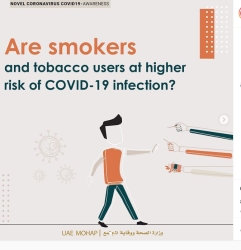 UAE’s Ministry of Health and Prevention is focusing on three main areas within tobacco control during the COVID-19 pandemic: enforcing a ban on waterpipe use in public places, a national awareness campaign and adapting smoking cessation services.
UAE’s Ministry of Health and Prevention is focusing on three main areas within tobacco control during the COVID-19 pandemic: enforcing a ban on waterpipe use in public places, a national awareness campaign and adapting smoking cessation services.
Ban on waterpipes in public places
On 12 March 2020, municipalities of different Emirates had issued a decision banning waterpipes in all restaurants and cafés. The decision was published in official newspapers and disseminated widely across social media platforms. This ban was monitored by economic development and municipalities affairs authorities. The response to the ban was mostly positive and restaurants and cafés immediately removed waterpipes. Where there were violations, they were met with fines and closures as needed. Using waterpipes in the privacy of homes and especially by youth still poses a challenge.
Awareness campaign during COVID-19
UAE’s Ministry of Health and Prevention, during the second week of March 2020, launched a wide-scale awareness campaign using its social media platforms. The reach figures during the period 17 April to 4 June include: 206 954 for Facebook posts and 299 118 for Instagram posts. During the same period, the engagement figure on Twitter reached 33 070.
To coincide with World No Tobacco Day 2020, a press statement by His Excellency the Undersecretary of Health was circulated widely. The statement stressed on the linkages between tobacco use and the transmission of the COVID-19 virus. The statement urged smokers to quit in order to reduce the risk of contracting the virus and to increase the recovery chances from COVID-19.
Adapting smoking cessation services
UAE’s Ministry of Health and Prevention shifted its smoking cessation services to virtual primary healthcare e-clinics during the pandemic. The physicians were able to carry out consultations and counselling for patients through the use of video communication and collaboration platforms.
Way forward
Currently, all lockdown restrictions have been lifted across UAE. The Ministry of Health and Prevention is developing a mass media campaign on tobacco control. The campaign will be launched by the end of 2020. Future plans will also include the integration of smoking cessation services in all primary healthcare clinics through an online training program that aims to enable all physicians to provide smoking cessation services and training of dentists to provide basic smoking cessation advice to patients.
Related links
Coronavirus: Dubai bans shisha pipes with immediate effect (The National)
No Tobacco Day: UAE Ministry warns smokers about COVID-19 risks (Khaleej Times)
UAE Health Ministry urges smokers to kick habit to mark 'World No Tobacco Day' (Gulf Today)
UAE’s Ministry of Health and Prevention post in Arabic on noncommunicable diseases and COVID-19
Waterpipe use banned in Dubai, Ajman, Fujairah and Ras Al Khaimah (Al Bayan)
Iraq bans waterpipes, creates awareness and combats illicit trade in tobacco products
Introduction
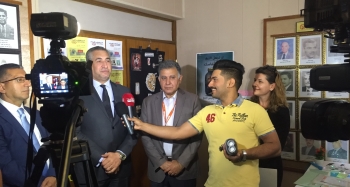 Iraq’s Government has set up a multisectoral Crisis Committee in response to the COVID-19 pandemic. The Crisis Committee is formed from a number of ministries which collaborate closely to curb the pandemic. Iraq’s Ministry of Health is ramping up health awareness activities during this critical period. The Higher Committee for Anti-smoking at the Ministry of Health has developed an emergency plan, based on the MPOWER package, introducing activities for tobacco control in light of the current restrictions. The Higher Committee is focusing on three main areas within tobacco control: enforcing a ban on use of waterpipes in public places, creating awareness through campaigns, and combating illicit trade in tobacco products.
Iraq’s Government has set up a multisectoral Crisis Committee in response to the COVID-19 pandemic. The Crisis Committee is formed from a number of ministries which collaborate closely to curb the pandemic. Iraq’s Ministry of Health is ramping up health awareness activities during this critical period. The Higher Committee for Anti-smoking at the Ministry of Health has developed an emergency plan, based on the MPOWER package, introducing activities for tobacco control in light of the current restrictions. The Higher Committee is focusing on three main areas within tobacco control: enforcing a ban on use of waterpipes in public places, creating awareness through campaigns, and combating illicit trade in tobacco products.
Ban on waterpipes in public places
At the onset of the COVID-19 pandemic, in the first week of March, one of the first decisions of the Crisis Committee was to close down coffee shops, cafés and restaurants. This decision directly impacted on the use of waterpipes. The decision came in light of the current health conditions as well as in line with measures to prevent infection with COVID-19 especially in venues where people gather in large numbers. Security forces ensured that coffee shops, cafés and restaurants were closed, with restaurants providing delivery services only.
In conjunction with these efforts, security forces have clamped down on youth who are using waterpipes in public gatherings. The forces have dealt with the violators according to the Iraqi law of 2012 which prohibits the use of tobacco products in all forms including waterpipes in public places.
Awareness campaigns during COVID-19
Iraq’s Ministry of Health disseminated widely to the Baghdad Health Department and other health departments a publication by the World Health Organization (WHO) showing the link between tobacco use and the transmission of the virus and the severity of the disease that causes COVID-19. In turn, health departments in Baghdad and all Iraqi governorates printed materials, based on the WHO publication, to raise awareness to the public. They complemented this with field visits to markets and venues of gatherings as well as individual visits to raise awareness about COVID-19 prevention, protection and risk factors including smoking and use of tobacco products.
Iraq’s health radio and other international media like ‘Sawa’ radio hosted tobacco combat programme officials through interviews to raise awareness about smoking and COVID-19, within that the use of waterpipes was highlighted as a key risk factor.
Iraq’s Ministry of Health, in collaboration with WHO, celebrated World No Tobacco Day 2020 with a webinar using videoconferencing. The virtual celebration was titled “Protecting youth from tobacco companies’ tricks and preventing them from smoking”. The webinar, held on 30 June 2020, was attended by WHO experts and representatives from the ministries of health, education, electricity, petroleum, interior, finance (customs authority), planning and trade, youth and sports, communications, agriculture, water resources, higher education and scientific research, culture and tourism, in addition to a number of senior officials from various governmental bodies.
Combating illicit trade in tobacco products
Iraq is Party to the Protocol to Eliminate Illicit Trade in Tobacco Products since 2015. Iraq’s Ministry of Health, in collaboration with the Council of State, has established a committee to form a Central Authority to follow-up the implementation of the Protocol and to provide the legal support needed for its implementation. It is expected that the Authority will be formed from representatives of the General Secretariat of the Council of Ministers in addition to representatives from the Council of State and the following ministries: health, interior, finance (customs authority), planning and trade. The role of the Authority will be key to support authorities which are combating illicit trade such as the General Customs Authority which has seized a number of illicit trade products recently.
The Council of State has been a partner in drafting the new tobacco law— drafted in line with the MPOWER strategy and the Protocol to Eliminate Illicit Trade in Tobacco Products— in preparation to passing it onto the Iraqi Parliament.
Way forward
Iraq’s Ministry of Health Heads of Departments met using video conferencing to develop a plan to relax lockdown restrictions after Eid El-Adha. Part of this plan will cover tobacco control activities. It is expected that coffee shops, cafés and restaurants will continue to be closed even when lockdown restrictions are relaxed in future.
Iraq’s Ministry of Health Tobacco Combat Division is looking to continue its awareness campaigns and is searching for a young influencer or celebrity to participate in these campaigns.
Iraq is looking forward to having guidelines for Protocol implementation and to collaborating with its neighboring countries to enact the Protocol to Eliminate Illicit Trade in Tobacco Products through bi-lateral agreements. It is also looking forward to building on WHO’s technical and practical experiences with countries in implementing the Protocol. In addition, the Central Authority for Specifications and Quality Control is looking to introduce some changes to the Iraqi standard specifications for tobacco products. The changes, such as ensuring that the importer includes data on the country of origin, will help trace tobacco products more effectively.
Related links
General Customs Authority seizes a number of illicit trade products recently (Facebook post)
General Customs Authority seizes a number of illicit trade products recently (Facebook video)
Iraq’s health radio highlights the negative effects of smoking (Facebook)


